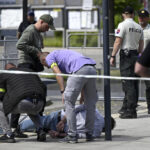
–>
December 4, 2022
In 1726, Jonathan Swift published Gulliver’s Travels. In the first part of this novel, “Gulliver in Lilliput country,” the hero learns the circumstances of the great war between Lilliput and Blefusku, which caused a dispute over a seemingly small matter: some believed that you should break boiled eggs from the big end, while their opponents advocated breaking eggs from the small end.
‘); googletag.cmd.push(function () { googletag.display(‘div-gpt-ad-1609268089992-0’); }); }
Sigmund Freud, in Der Narzissmus der kleinen Differenzen (1930, translated into English as Civilization and Its Discontents), drew attention to the potential for conflict among very close peoples and called this phenomenon “the narcissism of minor differences”:
It is always possible to bind together a considerable number of people in love, so long as there are other people left over to receive the manifestations of their aggressiveness. I once discussed the phenomenon that it is precisely communities with adjoining territories, and related to each other in other ways as well, who are engaged in constant feuds and in ridiculing each other — like the Spaniards and Portuguese, for instance, the North Germans and South Germans, the English and Scotch, and so on. I gave this phenomenon the name of “the narcissism of minor differences,” a name which does not do much to explain it. We can now see that it is a convenient and relatively harmless satisfaction of the inclination to aggression (the italic font is mine. —A.G.), by means of which cohesion between the members of the community is made easier.
In electricity, a similar effect is called the repulsion of charges of the same sign. Freud saw in the “narcissism of minor differences” a way to suppress the aggressiveness of neighboring peoples and achieve their cohesion in inflating “minor differences,” which help peoples get rid of their natural aggression in a “convenient” and “harmless” way. Such sublimation of aggressive instincts seemed to Freud as safe as freeing Spaniards from their aggressive tendencies by switching them over to bullfighting or acute rivalry between fans of soccer or basketball teams of one city, which reaches the point of hatred. Both sides of the conflict, according to Freud, exhibit narcissism — that is, national pride and the desire to emphasize one’s difference, one’s uniqueness, and the desire to separate one people from the other and to make one independent from the other.
‘); googletag.cmd.push(function () { googletag.display(‘div-gpt-ad-1609270365559-0’); }); }
The conflict between Russia and Ukraine is also about the “narcissism” of close peoples. But there are different kinds of narcissism. In the case of Russia, it is the narcissism of the empire. The Russian Federation bemoans the collapse of the Soviet Union and feels deprived because its territory has become smaller and Ukraine, Belarus, the Baltic states, the Caucasus, and Central Asia have separated from it. The Russian Federation considers the populations of the separated countries to be Soviet people and finds it natural to restore the Soviet Union — that is, to eliminate the independence of the former republics. Since the inhabitants of the former republics of the USSR are still Soviet people, it means that they are one people who should live in one country, the Russian Federation, the heir of the Soviet Union.
The war between Russia and Ukraine was started by Putin as a “special military operation” to eliminate “imaginary” differences between Russians and Ukrainians, to “liberate” Ukraine from “Nazis” — that is, people who consider Ukrainians a nation different from Russians. The departure of former Soviet republics from the Russian Federation, especially under the aegis of the West, is a blow to Russian narcissism: the vassal leaves his suzerain and looks for a new patron.
The Russian leadership claims to be at war with the collective West in Ukraine. However, there is another collective essence to this conflict. Russia is a collective narcissist, gripped by delusions of imperial grandiosity and delusions of grandeur. Russia behaves according to Ovid’s classic description of Narcissus: as a narcissistic power in love with its own image. The legend of Narcissus concludes with the death of the hero, who kills himself because of an abnormal infatuation with his own reflection. Blinded by an unrealistic assessment of his own power, the empire-narcissist engages himself in a dangerous adventure.
What is Ukraine’s “narcissism”? Ukraine is the closest post-Soviet society in terms of language and culture and the one historically most closely associated with the Russian Federation. Ukraine wants to turn a “minor difference” from Russia into a big difference. It wants to get rid of identification with Russia, of cultural and linguistic similarities and, in general, of any kind of dependence on the new Russian empire.
In the Russian Federation, Ukraine’s desire for independence is called not even nationalism, but Nazism. This is more understandable to Russian citizens: if they are “Nazis,” then they are enemies, just as they were during the Great Patriotic War — that is, World War II.
The concept of “narcissism of minor differences” is incompatible with the commandment to “Love thy neighbor as thyself.” The two Christian peoples do not love “their neighbor”; they try to distance themselves from him and turn “minor differences” into large ones. Sigmund Freud was wrong: the “narcissism of minor differences” did not turn out to be a “convenient and relatively harmless satisfaction of aggressive tendencies,” but an uncomfortable and hurtful satisfaction of aggressive tendencies. It proved to be a destructive and murderous, if not suicidal, means of expressing aggressive tendencies.
Image via Public Domain Pictures.
‘); googletag.cmd.push(function () { googletag.display(‘div-gpt-ad-1609268078422-0’); }); } if (publir_show_ads) { document.write(”
<!– if(page_width_onload <= 479) { document.write("
“); googletag.cmd.push(function() { googletag.display(‘div-gpt-ad-1345489840937-4’); }); } –> If you experience technical problems, please write to [email protected]
FOLLOW US ON
<!–
–>
<!– _qoptions={ qacct:”p-9bKF-NgTuSFM6″ }; ![]() –> <!—-> <!– var addthis_share = { email_template: “new_template” } –>
–> <!—-> <!– var addthis_share = { email_template: “new_template” } –>





